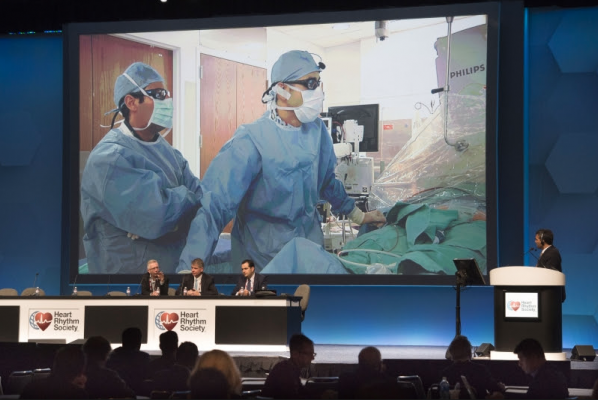
May 14, 2019 — The Heart Rhythm Society (HRS) released a first-of-its-kind consensus statement with guidance on the evaluation and management of arrhythmogenic cardiomyopathy (ACM), including findings on genetics and disease mechanisms. Recommendations included in the 2019 HRS Expert Consensus Statement on Evaluation, Risk Stratification, and Management of Arrhythmogenic Cardiomyopathy were presented at Heart Rhythm 2019, the HRS’s 40th Annual Scientific Sessions, May 8-11 in San Francisco.
ACM is a type of hereditary cardiovascular disease that is not explained by ischemic, hypertensive or valvular heart disease. Patients with ACM are predisposed to sudden cardiac death, especially in young patients and athletes. The presentation of ACM is most common between the ages of 10 and 50 years, with the mean age being 30. The main goal of treatment is the prevention of sudden cardiac death and an implantable cardioverter defibrillator (ICD) can be a lifesaving therapy option.
The consensus statement defines the broader condition of ACM that incorporates a spectrum of genetic, systematic, infectious and inflammatory disorders. The designation includes, but is not limited to, arrhythmogenic right/left ventricular cardiomyopathy, ion channel abnormalities, amyloidosis and left ventricular noncompaction.
"The diagnosis and management of ACM is constantly evolving and much of that is because of the uncertainty related to various genes. This is intended to serve as one central reference point for the management of any arrhythmogenic cardiomyopathy including therapy options and genetic testing," said document chair Jeffrey A. Towbin, MS, M.D., Le Bonheur Children's Hospital, Memphis, Tenn. "We hope that our guidelines will make decisions easier for clinicians and ensure that we are delivering optimal patient care by providing the first-ever set of comprehensive recommendations."
The authors highlight the following key points:
-
ACM is an inclusive designation referring to an arrhythmogenic disorder of the myocardium characterized by a clinical presentation with documented and/or symptomatic arrhythmia as a distinguishing feature;
-
Genetic testing is indicated for all disease associated genes and variants in patients and decedents;
-
Genetic counseling with a comprehensive three-generation family history should be performed;
-
Clinical evaluation including electrocardiogram, cardiac imaging and ambulatory monitoring is recommended for first-degree relatives every 1-3 years beginning at 10-12 years of age. Recommendations for ICD placement for primary and secondary prevention of sudden death are provided;
-
A shared decision-making approach to ICD placement should be used;
-
Beta-blocker therapy should be used for sinus tachycardia, supraventricular arrhythmias, atrial fibrillation or atrial flutter with ventricular rates resulting in ICD therapy;
-
Recommendations for limitation of exercise in patients with a clinical diagnosis of arrhythmogenic right ventricular cardiomyopathy (ARVC) and patients with positive genetic testing for ARVC without phenotypic expression are provided;
-
Recommendations for pacemaker and ICD placement in patients with cardiac amyloid are provided; and
-
Recommendations for ICD placement and anticoagulation in patients with left ventricular noncompaction are provided.
The members of the expert writing group utilized Population, Intervention, Comparison, Outcome (PICO) questions to evaluate contemporary evidence and provide clinical guidance related to exercise in ARVC. The writing committee also used a systematic literature search with evidence tables. Recommendations were endorsed by the writing group using the Class of Recommendation (COR) and Level of Evidence (LOE) system formulated by the American College of Cardiology (ACC) and the American Heart Association (AHA).
"Moving forward, we need to focus on new approaches to better understand the mechanisms responsible for the development and progression of the disease. Then novel treatment options can potentially be designed and tested," said document vice-chair William J. McKenna, M.D., DSc, University College London, Institute of Cardiovascular Science, London, U.K. "In addition, gene editing could provide new therapies, as could regeneration medicine. It is key for this future research to include the full array of disorders categorized under the umbrella of arrhythmogenic cardiomyopathy."
The expert consensus statement was written in collaboration with the ACC, the AHA, the Asia Pacific Heart Rhythm Society (APHRS), the American Society of Echocardiography (ASE), the European Heart Rhythm Association (EHRA), the Heart Failure Society of America (HFSA), the International Society for Heart & Lung Transplantation (ISHLT), the Japanese Heart Rhythm Society (JHRS), the Latin American Heart Rhythm Society (LAHRS), the National Society of Genetic Counselors (NSGC), the Pediatric & Congenital Electrophysiology Society (PACES), and the Sociedade Brasileira de Arritmias Cardíacas (SOBRAC).
The full document was also published in the online edition of HeartRhythm, the official journal of the Heart Rhythm Society.
For more information: www.heartrhythmjournal.com


 November 12, 2025
November 12, 2025 









